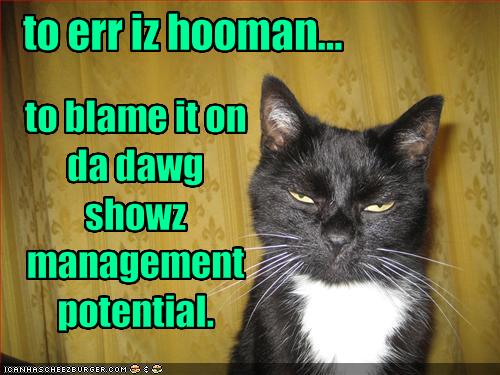I went home last night filled with joy and goodwill toward my development teams. This is one of the perks of building new software, there comes a time when you are overcome by joy. Can’t explain it. It’s a bit like any hard accomplishment, it just feels good when it happens.
Anyway, I go home, and after answering the question, who the heck are you and what are you doing in my house? I exercised my legal right to bore my spouse about what happens in the office. And here is where I was slammed back into reality of how possible it is to take a good idea and totally screw it up.
As luck would have it, I happened to be married to a wealth of use cases of some of the worst talent management practices known to man. Seriously, it might just be the experience of a varied career or it might be some kind of cosmic irony, but for every “best practice” I could talk about, he was able to give me a “worst case example” of how someone could (and did) totally screw it up.
So I decided to codify my own Meg’s law, as a proactive warning to call upon in the future if/when need should arise.
It is the intention of our team to build excellent, usable software to optimize a well thought out talent strategy. BUT if you suck, there is nothing we can do in software, to fix that for you.
So now that we’ve taken care of that disclaimer, here are some gem examples of suck-age.
You might suck if:
- You get feedback on employee development surveys that people are craving development and you arbitrarily mandate 10 training courses each quarter, causing people to cheat and scam instead of actually developing themselves. Bonus points if you didn’t even check to see if you had training courses that people found useful in the first place.
- You set quarterly aligned objectives and then change your mind weekly as to what the priorities are, never giving any hope of people achieving anything measurable. Bonus points when you come back at the end of the quarter and penalize individuals for lack of achievement. Double bonus points when you use this as the reason to not pay out bonus.
- You decide you need performance metrics and roll out a rushed performance review cycle only intending to use that data to figure out who to fire.
- You roll out talent programs that materially impact employment and compensation retroactively and don’t give any warning that they are coming.
So please, lets not suck. Frankly, it makes us all look bad when this kind of stuff happens. Instead, lets think about the point of a talent management strategy. It is not the end, it is the means.
And the purpose, is to help make your workforce a competitive advantage. If you are implementing a strategy that doesn’t address this goal, then I really am at a loss as to what to say when you wonder why it isn’t working.
Photo by sean dreilinger



 I’m probably not alone in the need to remind myself that the problems I’m worried about most, are usually me looking at the small problems.
I’m probably not alone in the need to remind myself that the problems I’m worried about most, are usually me looking at the small problems.